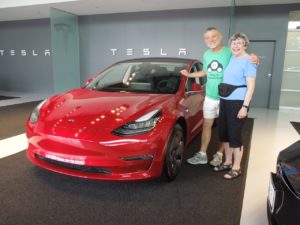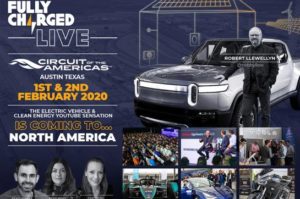Fully Charged Comes to Austin
Dale Bulla - Austin resident and electric vehicle expert - describes the EV life
By Michael Coleman
Austin’s Circuit of the Americas will become the epicenter of the electric vehicle universe this weekend with the arrival of YouTube sensation “Fully Charged” and its two-day lineup of events aimed at boosting the profile of these high-tech, climate friendly vehicles.
Fully Charged is based in the U.K. and focuses on electric vehicles and clean energy technology. The show is bringing its annual festival – Fully Charged LIVE North America – to Austin Saturday and Sunday. According to the Texas Electric Transportation Resources Alliance, Fully Charged LIVE will feature 30 panels on EVs, sustainability, and renewable energy along with other activities both inside and out. Attendees will be treated to a sneak peek at more than 50 new EV models, including the Porsche Taycan, Harley Davidson Livewire, Audi e-tron, and the much-anticipated Rivian truck. The interest in electric vehicles is so high in America (and Texas) that event tickets have already sold out!

Although tickets are all snapped up, it’s a good opportunity to talk with a local expert about his experience in this cutting-edge transportation realm, and why the Fully Charged show’s visit to Austin is so exciting.
Dale Bulla, a retired school teacher, advisor to the Texas Electric Transportation Resources Alliance and Tesla owner, graciously answered our questions.
PC: What are the best things about owning an electric vehicle? What is the biggest challenge?
Bulla: You drive on sunshine! The only regular maintenance is tire rotation, but number one is that they help to keep the air clean. There is really no challenge except trying to convince people to do something different than they have done their entire life
PC: Tell us about your experience with EV’s, or life outside the combustion engine realm of personal transportation.
Bulla: We have had two hybrids – two Leafs – and then one plug-in Prius Prime and now a Tesla 3. The Tesla is the most incredible vehicle I’ve ever owned, and I’ve owned a lot of vehicles. Once someone goes a test drive you don’t have to tell them (how great they are) anymore. It’s incredibly quiet incredibly smottth amaing eacceplartion and the fact that is no emissions is an extra plus. It’s super comfortable inside and the climate control and the the electronic stuff seems to work pretty flawlessly. I’ve heard people have had some problems but we haven’t had any problems.
PC: What questions do you most often get about your EV from curious friends or strangers you meet in the grocery store parking lot?
Bulla: Aren’t you afraid of running out electrons? Some of that is related to the very first versions of these vehicles, when their range was only a hundred miles. Now some of them have over a 300-mile range. I plug it in every morning for an hour when I work out and then I have plenty of juice for my driving needs. And then they ask ‘howcan you afford a Tesla, aren’t they super expensive?’ Well, a lot of the charging stations are free because people want to attract customers. Some hotels, for example, have free charging stations. Others don’t and others have a fee. We drove to Wisconsin and drove about 4,800 miles and it cost 70 dollars. The average truck purchased in Texas is a Ford F-150 and it’s $52,000. They have no problems paying $50,000 for a truck, but won’t think about paying $40,000 for an electric vehicle.
PC: It’s exciting that an internationally popular event like “Fully Charged” is coming to Austin. What are you most looking forward to in terms of this weekend?
Bulla: Attending the many workshops. This particular event has traveled around the country in the past and its really growing in popularity. It’s just an international phenomenon and the rest of the world is moving a lot faster than we are. In Europe, they’re banning fossil fuel vehicles in some of the city centers.
PC: What is you assessment of Austin – and Texas generally – and its relationship to EVs? Are we ahead of the curve? Behind? And what are the most important things people can do to help spread the good news about EV’s and get more of them on our roads to replace combustion engines?
Bulla: Austin is way ahead in Texas but far behind other states. Once we have a price on carbon, the transition will happen very fast when gas hits $5 or $6 a gallon or more. The economic argument is the biggest one. Thirty percent of our emissions come from transportation. The the key is to just get people in them. If you can get butts in the seats, then you don’t have to sell the car. The key is to get out there and try one.